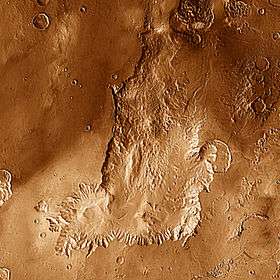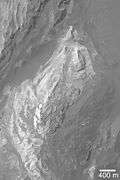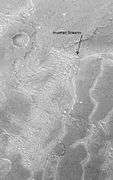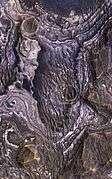Juventae Chasma
Juventae Chasma is an enormous box canyon (250 km × 100 km) on Mars which opens to the north and forms the outflow channel Maja Valles.[1] Juventae Chasma is located north of Valles Marineris in the Coprates quadrangle and cuts more than 5 km into the plains of Lunae Planum.
 Juventae Chasma in mosaic of THEMIS infrared images. Maja Valles extends north from the top of the image. Part of Baetis Chaos is visible at the top, with a smaller chaos region to its right. | |
| Coordinates | 3.5°S 61.4°W |
|---|---|
| Length | 320.0 |
Name
Juventae was named by Schiaparelli after Juventae Fons, the fountain of youth.[2]
Observations
The floor of Juventae Chasma is partly covered by sand dunes. There is also a 2.5 km high mountain inside Juventae, 59 km long and 23 km wide, that was confirmed by Mars Express to be composed of sulfate deposits.[3] MRO discovered sulfates, hydrated sulfates, and iron oxides in Juventae Chasma.[4] Juventae Chasma has four bright mounds or light-toned interior layered deposits (IlD's), as they are often called. Researchers have found that monohydrated sulfates were first deposited on the floor. And then polyhydrated sulfates were laid down. Kieserite, a magnesium sulfate, was also found in Juventae Chasma.[5] Studies from satellites orbiting Mars have found channels on the eastern, western, and southern walls of Juventae Chasma. They seem to have different origins. Some may have started from melting snow, others from groundwater sapping, and still others from precipitation. Inverted channels are also present.[6][7]
Inverted relief that are visible in Juventae Chasma are also visible in other parts of Mars. This occurs when sediments are deposited on the floor of a stream and then become resistant to erosion, perhaps by cementation. Later the area may be buried. Eventually, erosion removes the covering layer and the former streams become visible since they are resistant to erosion. Mars Global Surveyor found several examples of this process.[8][9]
 Light toned sedimentary outcrops on the floor of Juventae Chasma.
Light toned sedimentary outcrops on the floor of Juventae Chasma.- Juventae Chasma Troughs, as seen by HiRISE.
 Inverted Streams near Juventae Chasma, as seen by Mars Global Surveyor. These streams begin at the top of a ridge then run together.
Inverted Streams near Juventae Chasma, as seen by Mars Global Surveyor. These streams begin at the top of a ridge then run together.- Inverted Channels near Juventae Chasma, as seen by HiRISE. Channels were once regular stream channels. Scale bar is 500 meters long.
- Layers west of Juventae Chasma, as seen by HiRISE. Scale bar is 500 meters long.
 Plateau near Juventae Chasma.
Plateau near Juventae Chasma.
References
- PIA03818: Floor of Juventae Chasma
- Blunck, J. 1982. Mars and its Satellites. Exposition Press. Smithtown, N.Y.
- Sulphate deposits in Juventae Chasma
- Murchie, S. et al. 2009. A synthesis of Martian aqueous mineralogy after 1 Mars year of observations from the Mars Reconnaissance Orbiter. Journal of Geophysical Research: 114.
- Noel, A., J. Bishop, M. Al-Samir, C. Gross, J. Flahaut, P. McGuire, C. Weitz, F. Seelos, S. Murchie. 2015. Mineralogy, morphology and stratigraphy of the light-toned interior layered deposits at Juventae Chasma. Icarus: 251, 315–331
- Singh et al. (2016) Lunar Planet. Sci. XLIV Abstract#1766.
- Singh, P., et al. 2017. The Diverse Channel Networks of Juventae Chasma, Mars. Lunar and Planetary Science XLVIII (2017). 2603.pdf.
- Malin, Michael C. (2010). "An overview of the 1985–2006 Mars Orbiter Camera science investigation". The Mars Journal. 5: 1–60. Bibcode:2010IJMSE...5....1M. doi:10.1555/mars.2010.0001.
- "Sinuous Ridges Near Aeolis Mensae". Hiroc.lpl.arizona.edu. January 31, 2007. Archived from the original on March 5, 2016. Retrieved August 18, 2017.
See also
- Chasma
- Climate on Mars
- Geology of Mars
- HiRISE
- Inverted relief
- Lakes on Mars
- Mars Global Surveyor
- Valley networks (Mars)